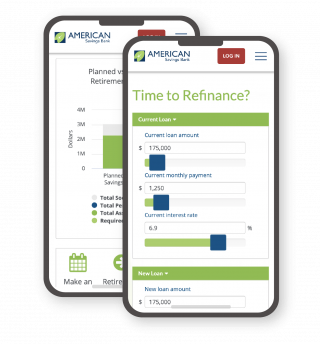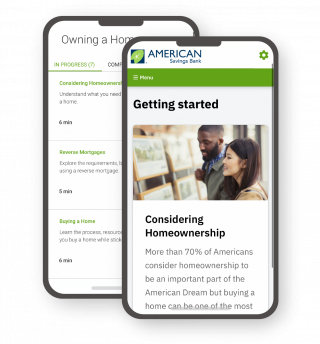It’s not uncommon to put in time and effort to better yourself and live a healthier lifestyle. You might make an annual trip to visit your doctor for a wellness checkup. But what about your financial health? Creating and maintaining healthy personal saving habits are just as important to your overall wellbeing.
Set yourself up for financial success by examining your personal spending and saving habits with a financial checkup. We've created these easy-to-use checkups that will take you through your next financial milestone. Answer a few questions, get your results and make an appointment with a banker.
Healthy financial habits start with knowing how much money you have and allocating it in a budget. The goal of budgeting is to organize your finances so that you spend less than you make, giving you flexibility and the freedom of extra income. Good budgets come from a critical look at what you spend your money on and recognizing what expenses are “must haves” versus “nice to haves.”
CREATING A BUDGET
Your first task to setting a realistic budget is to add up your monthly expenses. Remember to include rent or mortgage payments, utilities and credit card expenses. To make your expenses more organized, group them into two categories: Known and Unknown. Known expenses will include any recurring payments you may have while unknown expenses give you room to estimate expenses that might fluctuate (e.g. credit card bills). You can estimate your unknown expenses by looking at average costs from the past six months.
Once you know your monthly expenses, add up all of your monthly income. Income is most commonly money that is paid from an employer. However, remember to include other sources of income as well, such as items sold online or investment dividends.
Compare your expenses and income to see if you have an overage or shortage. If you have an overage, you can put that extra money towards savings goals. If you happen to come up short, you’ll need to evaluate your expenses and determine if anything can be cut. Once you have your expenses lower than your monthly income, keep record of your spending and savings habits so you can stay on track with your newly-created budget.
Worried you might forget an expense or income source when creating your budget? Use our helpful calculators which can give you more insight into your spending.
Living 100% debt-free is ideal, isn’t it? Not necessarily. Although the word “debt” might bring to mind an image of a shady debt collector, some debt is necessary. The key to managing debt is to understand the different types of debt. Generally, debts can be classified into two categories: Good Debt and Bad Debt.
Good Debt: This debt is considered a long-term investment and will often grow in value over time (e.g. student loans and mortgages).
- Bad Debt: This debt is used to purchase things that have no long-term value (e.g. carrying a balance on high interest credit cards and cash advance loans).
STAYING OUT OF DEBT
While it’s generally a good idea to keep an affordable amount of good debt for your credit score, there are ways to avoid unnecessary or bad debt. The general rule for maintaining a good amount of debt is to spend less than 25% of your income on required debt each month.
For example, if you consistently rack up a large credit card bill, switch to using a checking account instead. Every checking account comes with a contactless Visa® debit cards make it easy to safely and securely pay, without increasing your credit card debt.
BORROWING MONEY WISELY
Perhaps the easiest way to avoid unnecessary debt is to be smart about borrowing money. In other words, use your credit wisely. Just because credit is available for a purchase doesn’t mean you should always use it. Look at different loan options available when making a large purchase such as a car or house to find the best interest rate.
CONSOLIDATING DEBT
Sometimes you find yourself with several different debts at once. Those various debts might have a wide range of interest rates or monthly payment amounts. Debt consolidation is the practice of replacing existing debts with a single new debt. Often debt consolidation is used to get a better interest rate or lower monthly cost by combining multiple loans into one.
Much like other types of debt, we’re often taught to fear credit cards. However, when used wisely, credit cards can be one of the best ways to maximize the value of your money.
A common benefit to opening a credit card is to build or increase your credit score. Credit scores take into account a range of factors, but one is amount of credit available. Credit Cards can help your credit score in this area. For example, if you open a credit card with a credit limit of $5,000 but only spend $2,000, that's $3,000 of available credit that could positively impact your credit score.
Another reason to open a credit card is to receive rewards or other perks. Many credit cards offer a program that rewards you for every dollar spent. You can then redeem your rewards for things like gift cards, merchandise, or even cash back, depending on your card.
Need to make a big purchase and worried about interest rates? Some credit cards provide low interest rates if you do have to carry a balance. To avoid paying interest at all on a credit card, pay down your balance to $0 each month.
Establishing savings for life’s major events is one of the most important ways to prepare for your future. Moving out on your own, buying a home, having a baby, paying for your keiki's education and enjoying retirement are life events most of us hope to one day enjoy. A healthy savings can protect us against less fortunate events, such as a new roof if you already own your home. Getting started doesn’t have to be difficult. Every small piece you put towards your savings can have a lasting effect on your future financial wellbeing.
THINK SHORT-TERM
Make a small goal to save each week or month instead of only thinking of long-term goals. For example, aim to save $20 each week. This helps you stay on track as you immediately fulfill each small goal.
ESTABLISHING SAVING HABITS: PAYING YOURSELF FIRST
A good rule of thumb is to put 10% of take home pay in savings and live off the remaining balance. Services like Online Banking allow you to easily transfer money each month into your savings account.
SET UP A RETIREMENT PLAN
Retirement plans are accounts that save money over time specifically for retirement. Often a retirement account will have some sort of tax benefit to it as well. Always remember to consult your tax advisor on tax-savings with retirement plans. Some types of retirement accounts include:
Individual Retirement Account (IRAs): This is separate from an employer retirement account and usually come in two types: Roth and Traditional IRA. With a Roth IRA, the money you put in is taxed at the time you contribute, but can be withdrawn income tax-free in retirement. Traditional IRA contributions can be deducted from your current taxes but are taxed when you withdraw money in retirement.
401 (k): This is an employer-sponsored plan. Many 401 (k) plans feature an employer match program where the employer will contribute money to an employee’s account up to a certain percentage of the amount that employee contributed.
- Pensions: Pension plans are an employer-sponsored retirement plan that pays a set amount to an employee in retirement based on years worked and salary history.
SELECTING THE RIGHT ACCOUNTS TO DEVELOP SAVINGS
You can maximize your savings by using several different account types. Each type of savings account has different benefits.
Savings and Money Market Accounts: A regular savings account holds your money for safekeeping and earns a modest interest rate. Money Market accounts earn high interest rates for higher balances and give you access to your funds by check.
Investment Accounts: These accounts put your money to work on the market. You may choose to put your money into stocks, mutual funds, bond, ETFs, or a combination of these types of funds.
Direct Deposit: Send your paycheck or other funds directly to your savings or checking accounts.
- Certificates of Deposit (CDs): Earn a set amount of interest, usually higher than an average savings account, by putting money into a CD for a set term. We offer terms from 7 days up to 10 years.
Buying a home, whether it's your first time or you’ve bought before, can be a stressful process. We are here to remove that stress with solutions that meet your needs.
FIRST-TIME HOMEBUYERS IN HAWAII
Hawaii residents looking to buy their first home will benefit from the knowledgeable resource of a local home loan expert. First time home buyer programs often include lower down payment requirements.
VACATION HOMES OR INVESTMENT PROPERTIES IN HAWAII
Many people choose our beautiful island as their destination for a second home. A local residential loan officer can help you determine your borrowing situation for your second home. ASB also offers competitive rates for investment properties in Hawaii.
LOANS THAT EXCEED THE CONFORMING LOAN LIMITS IN HAWAII
Looking to get your dream home, but worried the purchase price is too high for a regular mortgage? We offer Jumbo Loans created to serve high-value properties. Let our experienced residential loan staff help you prepare to make this large financial decision and provide you with the resources you need.
VETERANS BUYING A HOME IN HAWAII
The U.S. Department of Veterans Affairs (VA) Loan Program is backed by the U.S. Department of Veterans Affairs and is available for eligible service members and veterans. Plus, you can take advantage of the zero down payment up to the VA county loan limit.
LEVERAGING THE VALUE IN YOUR HOME IN HAWAII
Existing homeowners can benefit from paying down their mortgage. Each payment towards your loan’s principal helps build your equity in the home. This equity can be used to make changes to the home, like renovations or upgrades. You can also use the credit built from your home loan to lower your monthly payment or decrease your interest rate through a refinance.
Home Equity Line of Credit (HELOC): This line of credit is secured by the equity in your home and can be used for things like home renovations, education payments and more. Fixed Rate Equity Loan Options (FRELO) are also available.
Mortgage Refinance: We have rate and term refinancing options that can help lower your payments. Talk to one of our loan officers for more details.
















